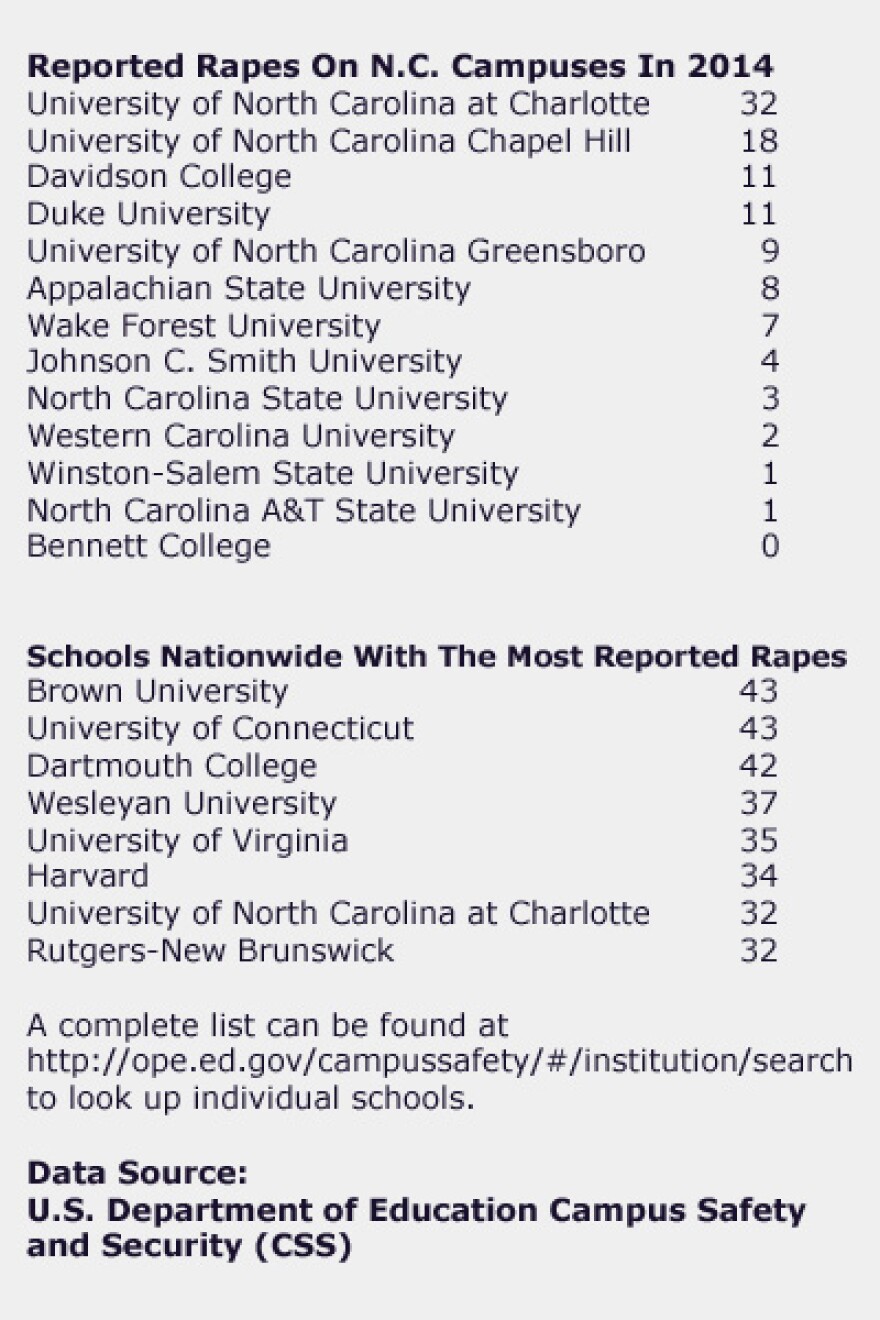The number of rapes reported on college campuses is going up. UNC Charlotte has experienced one of the largest jumps, according to the U.S. Department of Education.
Thirty-two sexual assaults were reported in 2014, the most recent year available. A year earlier, there were only three. The 32 cases were the seventh highest in the country among college campuses, but university officials don’t necessarily see the increase as a negative.
Walking alongside a wooded area on campus, UNC Charlotte Police Chief Jeff Baker says it’s not strangers lurking behind bushes who are sexually assaulting students. He says victims usually know their attackers, often meeting them at a party or an off-campus event— and that the assaults happen in off campus apartments and residence halls.
“It’s extremely difficult to enter our residential halls unless invited or taken in by someone,” Baker said. “So you have to be very careful who you take in your hall or room because they were known offenders.”
That’s one of the messages that Baker and other university officials give students. Another is that help is available for rape victims.
“Because we’ve added multiple resources to the community so that survivors of sex assault can feel more comfortable reporting sex assault. To see an increase is a good thing,” Baker said.

A good thing because Baker sees the increase as a result of those additional resources. So does dean of students, Christine Davis.
“Those are 32 individuals we’ve been able to connect with and hopefully support through the process,” Davis said. “The fact that we do have that number is reflective of the amount of time we’ve put in making our resources available and ourselves more well-known as a resource for students.”

Historically, Davis thinks many colleges tried to protect their reputations when it came to sexual assaults.
“A lot of colleges fell into that chasm of pushing things under the rug because they didn’t want it to look bad for their school and didn’t want their recruiting numbers to go down,” Davis said.
Things changed in 2011. The federal government cracked down on schools for being lax in reporting rapes. At UNC Charlotte the Title IX coordinator’s position soon became full time. Title IX governs sexual discrimination in federal education programs and is a key tool used in combating sexual assault.

“Initially, our Title IX coordinator was a department of one. It became necessary to hire an administrative assistant and individuals to investigate incident reports that come in,” said Susan Burgess, the university’s compliance director.
There’s also an effort to let students know their rights. For example, it’s the victim’s decision to file a criminal complaint.
Ten of the 32 sexual assault cases in 2014 were filed with police says university Police Chief Baker. Title IX and dean of students officials must investigate all sexual assaults reported to them, where the burden of proof is lower. Over the past five years, two students were expelled stemming from sexual assaults they investigated.
Burgess said, “There may not be witnesses to the incident and with the lower standard of preponderance of evidence, it's easier for us to adjudicate a case between two individuals where one is accusing and the other is denying.”

"What I’m pleased to hear that UNC Charlotte knows there are two processes that are triggered when something like this happens,” said Lisa Maatz, vice president of government relations for the American Association of University Women. “Sometimes people forget that. They assume people should just go through the criminal process, and for students, what they want is to get on with their education and feel safe again.”
The 32 reports include a handful of students who visited the counseling center. Counselors notify the school when students say they’ve been raped, but names are kept anonymous.
"It’s important for a survivor of assault to be in control of who they tell and when they tell,” said Rebecca MacNair-Semands, the counseling center’s clinical director. “We want victims and survivors to feel safe to make these reports and feel that the system will support them through the process.”

The center provides free individual and group counseling, but MacNair-Semands believes some victims don’t seek help.
“We would hear at the center about a lot more rapes than were ever reported, so there are always going to be a lot of women who deal with it privately. We’re trying to shift that because carrying that burden alone is one of the most traumatic experiences a person can have,” Semands said.
At the university student center, Essence Sowell, Lori White and Searra Conley say they didn’t know the number of sexual assault reports was so high.
“It’s kind of creepy to hear it from you because I haven’t heard that, but it raises a lot of concern,” Sowell said.
“It’s kind of scary especially being a girl,” White said. “They do tell you to not walk alone but in groups and some boys make fun of you for it.”

“We had a survey about how safe we felt last year but I wasn’t aware of the rapes, no one really talks about it,” Conley said.
But, there are signs that UNC Charlotte’s message awareness campaign is working. Andre Jefferies says he heard about the rapes at student government meetings and through his fraternity.
“It’s pretty shocking,” Jeffries said. “We have these safety stations on campus for students if they feel they’re in trouble at night so that number was a bit surprising.”
University Police Chief Baker says he won’t be surprise if the numbers continue to go up as more students become aware of the support system in place.




